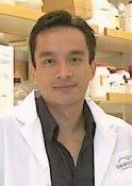 Christopher Ong is someone who recognises talent around him and engages them to help achieve his goals. Picture nine students from his biochemistry course lined up in front of the class, handing off a football, crouching down and then standing up, as Dr. Ong talks them through the signalling pathways within the cell. Now imagine the same explanation, this time choreographed as the Biochemistry of Life Ballet, performed by his nieces, one of whom dances with the Royal Winnipeg Ballet, and other dancers at their neighbourhood studio, set to music, narrated by Dr. Ong and videoed for publication in an online science journal.
Christopher Ong is someone who recognises talent around him and engages them to help achieve his goals. Picture nine students from his biochemistry course lined up in front of the class, handing off a football, crouching down and then standing up, as Dr. Ong talks them through the signalling pathways within the cell. Now imagine the same explanation, this time choreographed as the Biochemistry of Life Ballet, performed by his nieces, one of whom dances with the Royal Winnipeg Ballet, and other dancers at their neighbourhood studio, set to music, narrated by Dr. Ong and videoed for publication in an online science journal.
“The stage is the cell and the dancers are proteins interacting with each other causing a cascade of events,” Dr. Ong says. “People understand concepts in different ways. Circles and arrows on a chalkboard don’t make sense to everyone.”
A firm grasp of signalling pathways is central to Dr. Ong’s research. Early in his career, he and his colleagues, screened approximately 3,000 marine extracts from Earth and Ocean Sciences Professor Raymond Andersen’s medicinal library, which contains one of the largest marine extract libraries in the world, to identify molecules that would trigger the SH2-containing inositol phosphatase (SHIP), which Pathology and Laboratory Medicine Professor Gerald Krystal had found to inhibit inflammatory signalling.
Dr. Ong and fellow biochemist, Dr. Alice Mui, successfully identified a novel class of small molecules from the Papua New Guinea sponge, Dactylospongia elegans, that activates SHIP. They developed an efficient way of producing the compounds synthetically and tested them in animal models of inflammation and cancer to demonstrate the compounds as a robust activator of SHIP and as a potent anti-inflammatory and anti-leukemia/lymphoma agent.
As an undergraduate student, Dr. Ong was inspired by Dr. Julia Levy, who co-founded a spinoff company called Quadra Logic Technologies (now QLT Inc.) to commercialize her UBC research. “I was really excited because the whole field of biotechnology was just starting up, and I had this amazing professor with her own company that was developing new drugs and therapies with the potential to treat disease.”
Once experiments with the SHIP-activating molecules were far enough along, Dr. Ong and fellow scientists, Drs. Krystal, Andersen and Mui, started meeting with UBC professors who had started their own companies to gather ideas and advice. In 2006, they co-founded Aquinox Pharmaceuticals Inc., a biopharmaceutical company focused on developing small molecule therapeutics for the treatment of cancer and inflammation. The company has since secured $40 million in venture capital financing through an international syndicate of investors, and the drug is now in Phase II clinical studies for the treatment of asthma and other inflammatory diseases.
Back when Dr. Ong was exploring options for his PhD research, the first investigators were being recruited to the new Biomedical Research Centre at UBC. Under the supervision of Dr. Jamey Marth, he learned the novel technique of creating transgenic animal models of human diseases to test new drugs.
This valuable expertise helped him secure his current position as a Senior Scientist with the Vancouver Prostate Centre working closely with clinical faculty in the Robert H.N. Ho Research Centre. Now an Assistant Professor with a cross-appointment in the departments of surgery and urologic sciences, Dr. Ong is investigating disease mechanisms at the molecular and cellular levels and developing new molecular targeted therapeutics for treating a variety of disease including cancer and immune related disorders such as transplant rejection and inflammatory diseases. In one exciting area of research, Dr. Ong has identified a key signalling protein that seems to be a master regulator of growth and survival of prostate cancer. He and his colleagues at the Vancouver Prostate Centre are now developing novel protein therapeutics to inhibit this pathway. He hopes to move these exciting new drugs forward to clinical trials for treatment of advanced prostate cancer next year.
Comments are closed, but trackbacks and pingbacks are open.